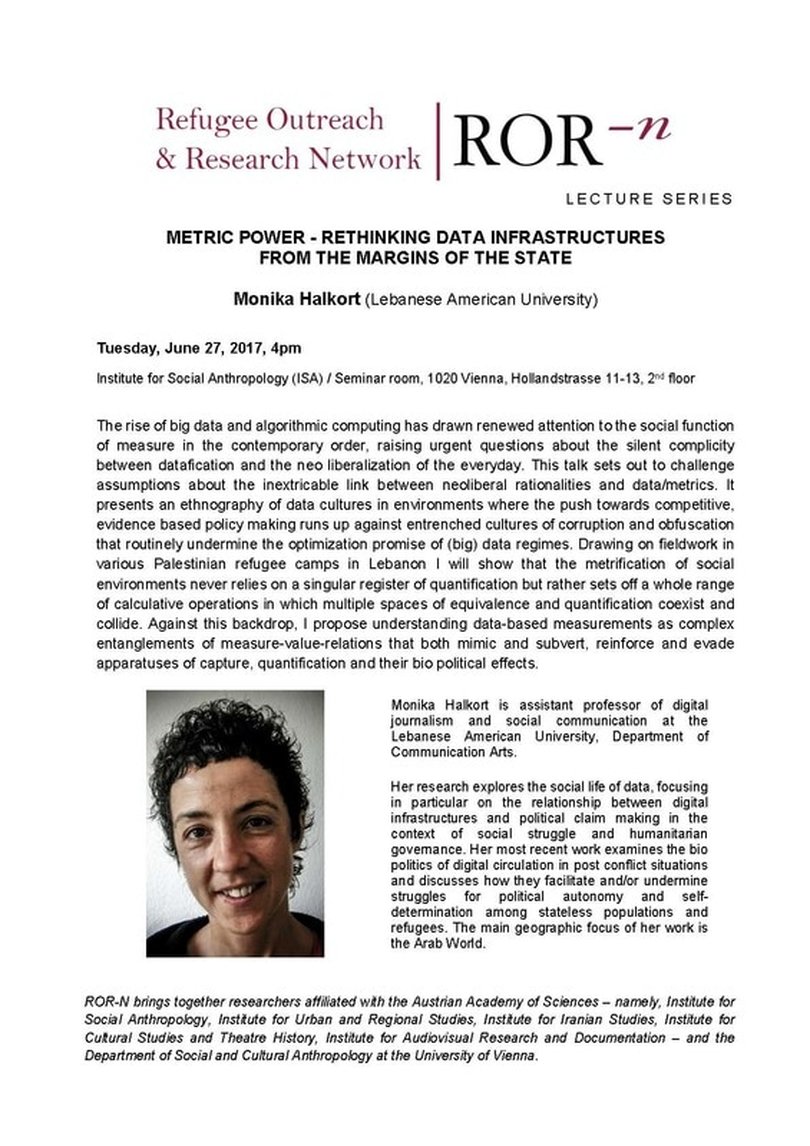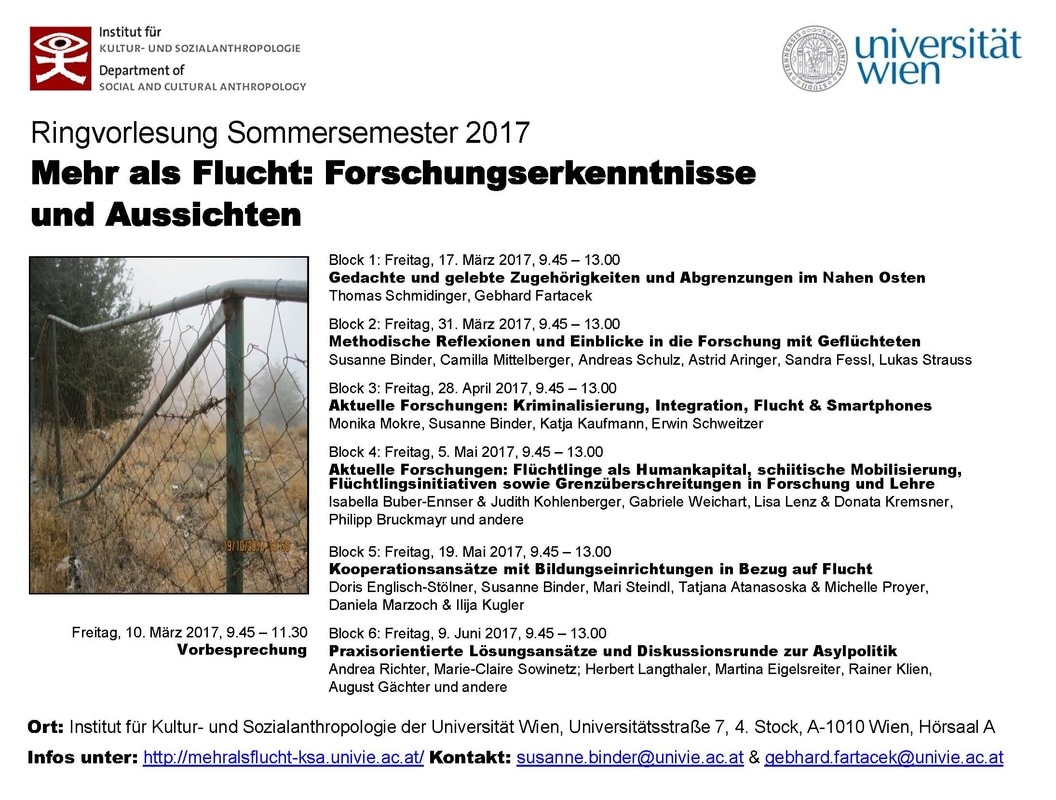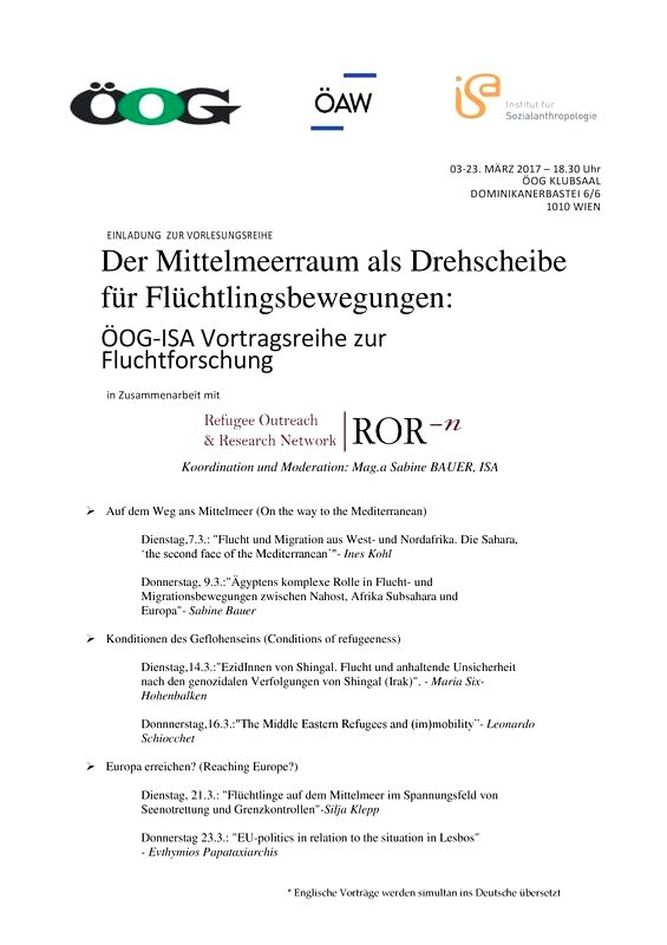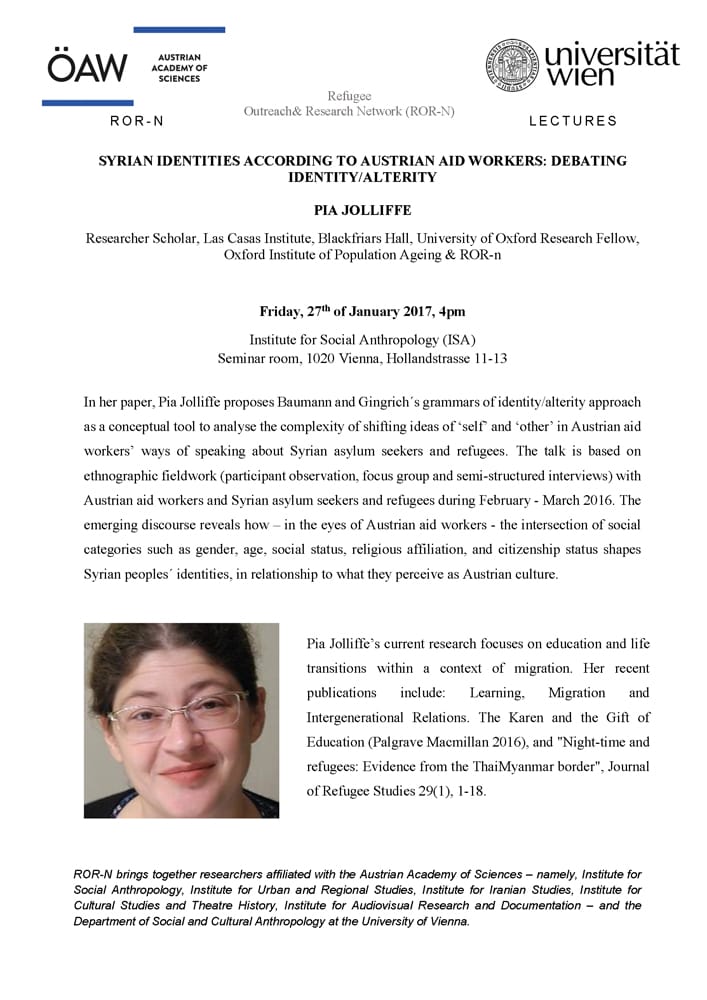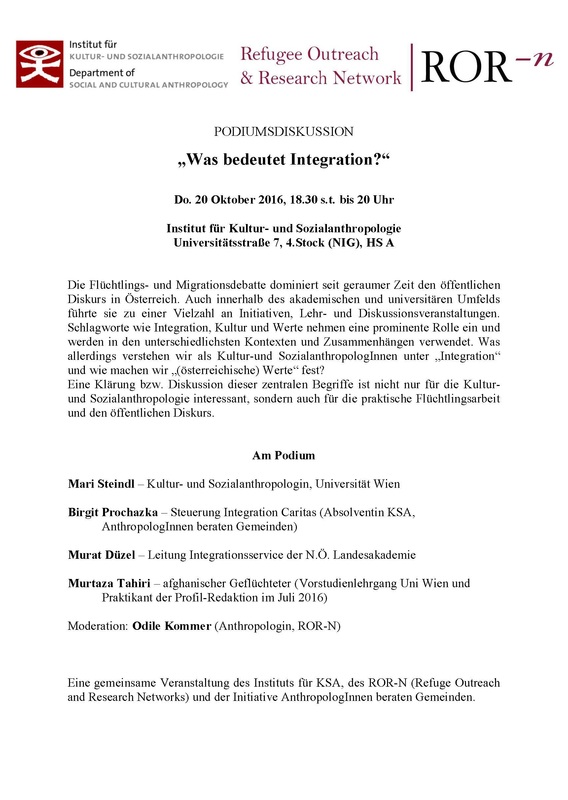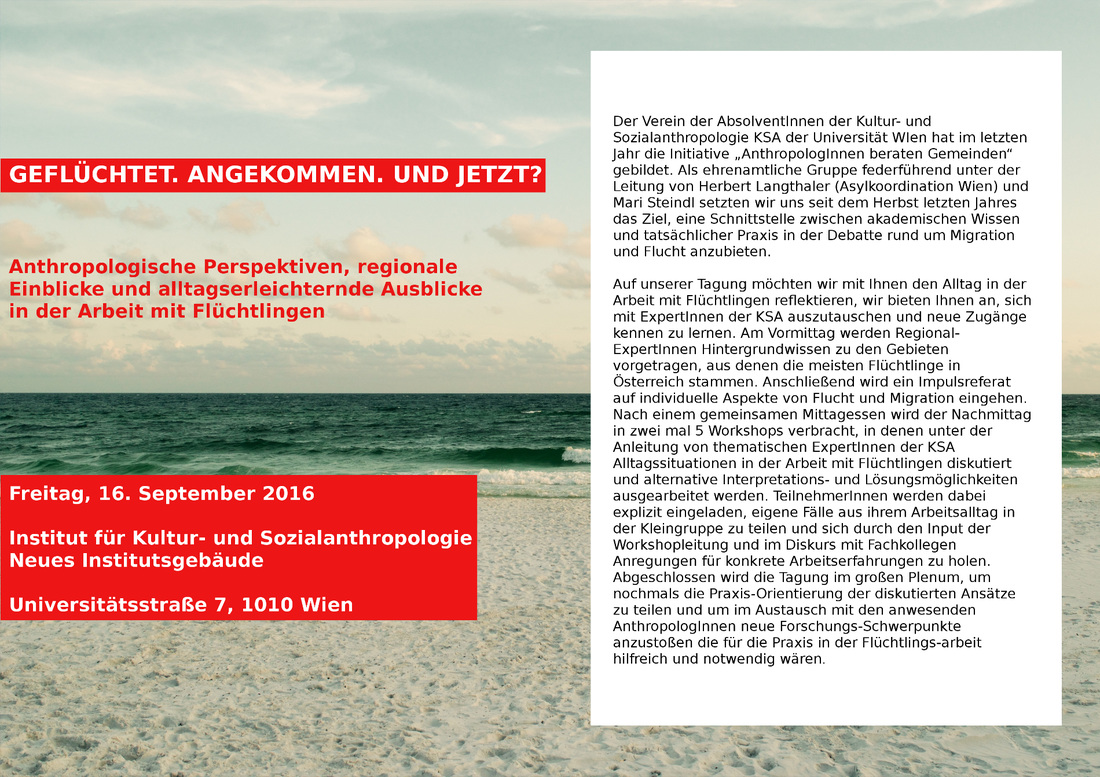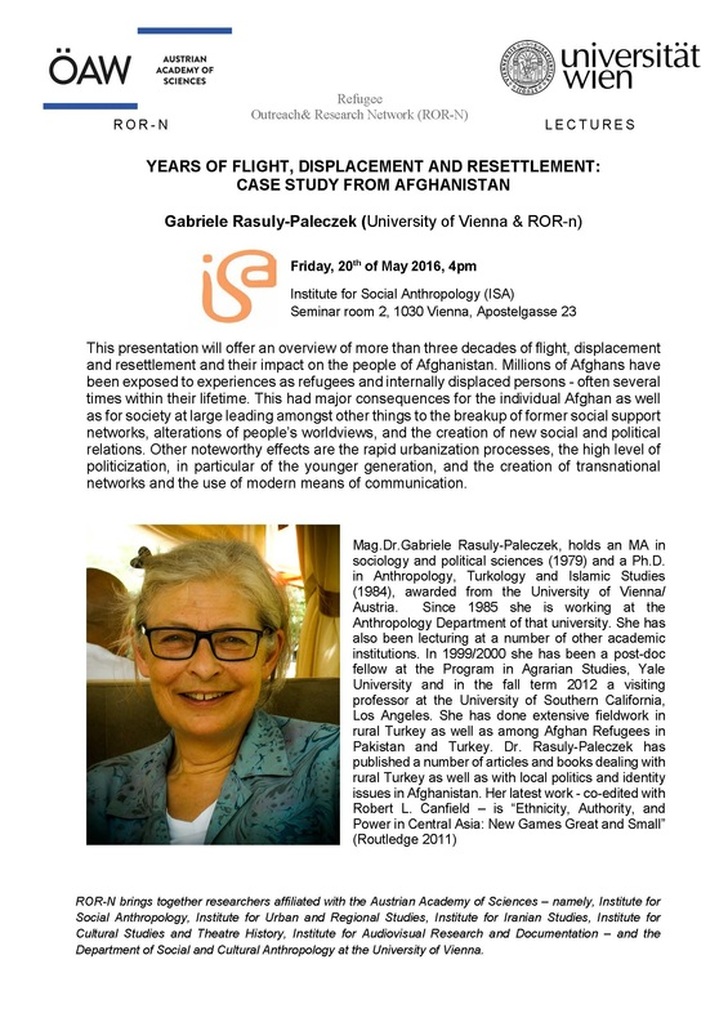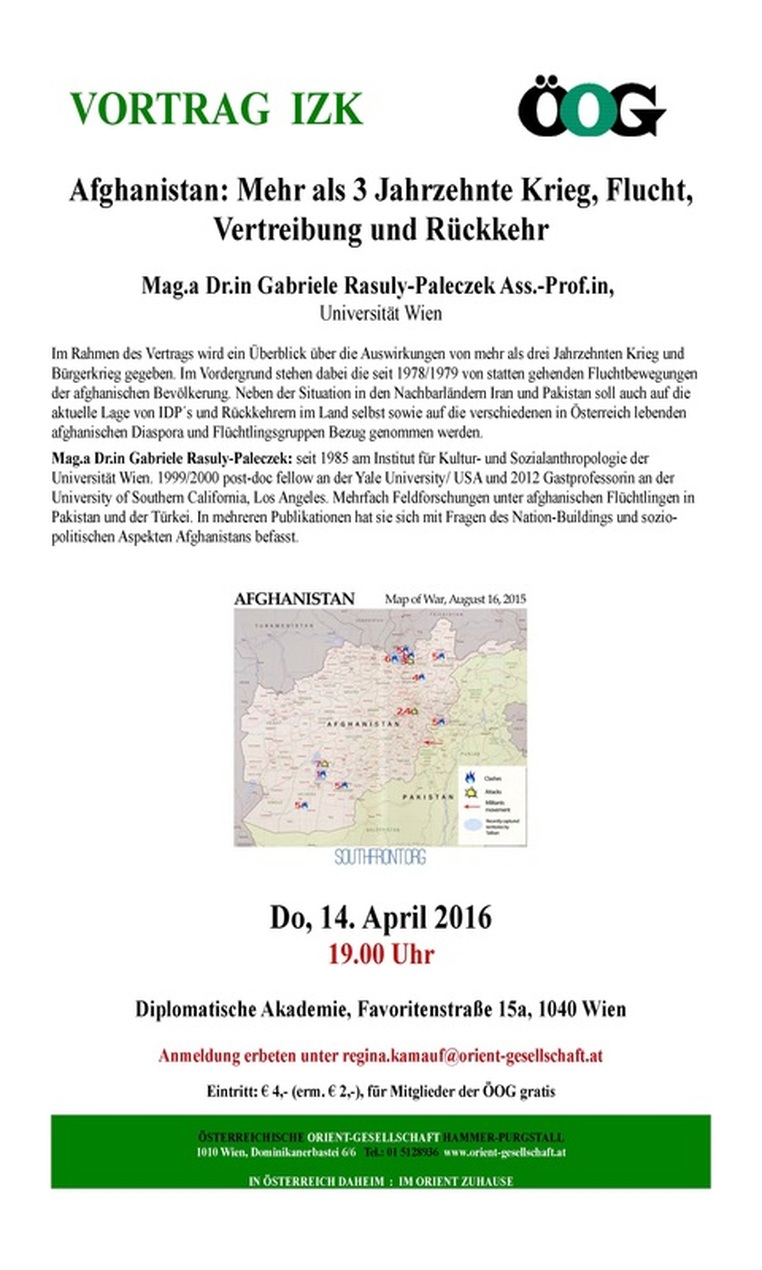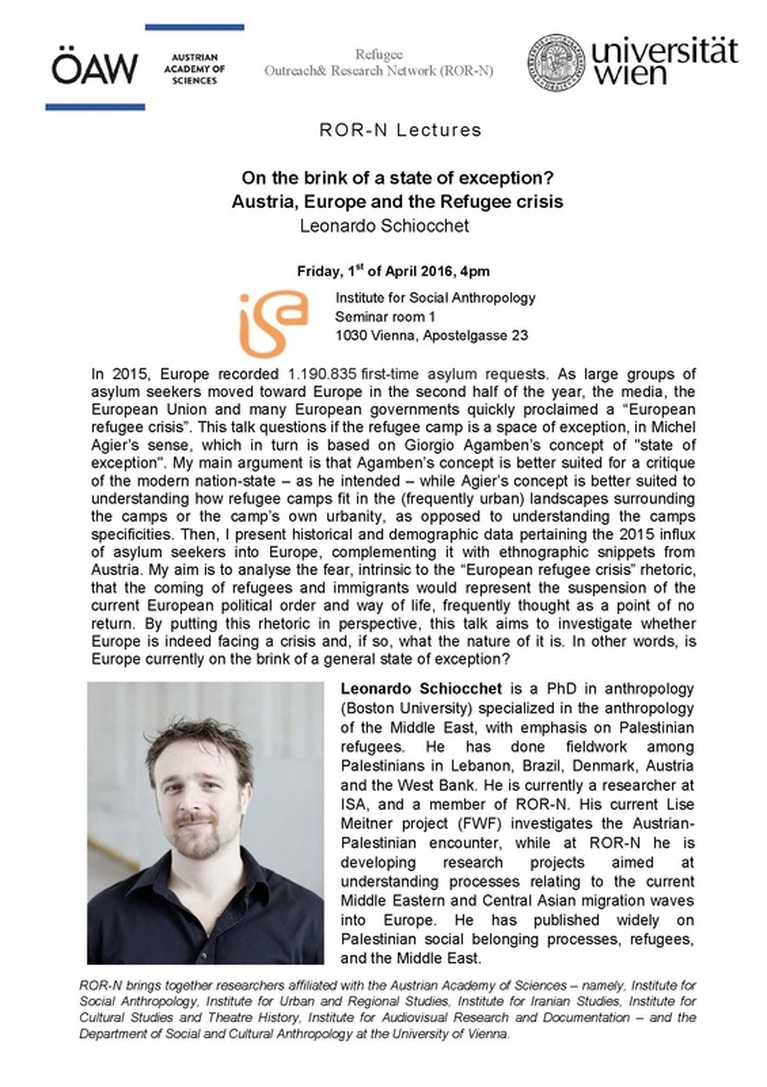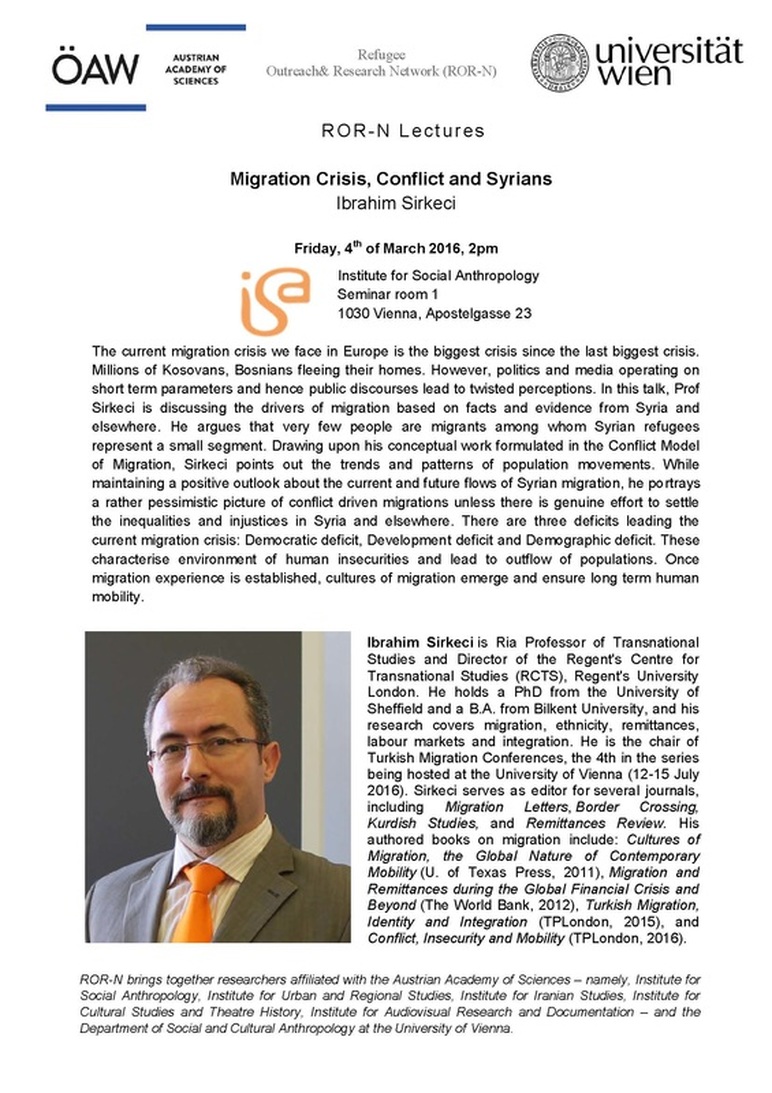Our events & opportunities
upcoming
International online conference
In/visibility of Flight
Un-/sichtbarkeit von Flucht
(English and German)
Friday, 25th of June 2021, 9:00 to 18:00
Online via Zoom
The Refugee Outreach and Research Network (ROR_n) is organizing a conference on World Refugee Day at the Austrian Academy of Sciences (ÖAW) to address the visibility and, more importantly, the invisibility of flight and being a refugee. (English and German)
Das Refugee Outreach and Research Network (ROR-n) veranstaltet am World Refugee Day an der Österreichischen Akademie der Wissenschaften (ÖAW) eine Konferenz, die sich mit der Sichtbarkeit und vor allem der Unsichtbarkeit von Flucht und Geflüchtetsein beschäftigt.
Join Zoom Meeting
https://us02web.zoom.us/j/86954824810?pwd=NlFPN29Jb0VqcG8vN2dLVkRZWGxVdz09
Meeting ID: 869 5482 4810
Passcode: qMW4Az
See PDF below for full details and schedule and download abstracts and CVs here
In/visibility of Flight
Un-/sichtbarkeit von Flucht
(English and German)
Friday, 25th of June 2021, 9:00 to 18:00
Online via Zoom
The Refugee Outreach and Research Network (ROR_n) is organizing a conference on World Refugee Day at the Austrian Academy of Sciences (ÖAW) to address the visibility and, more importantly, the invisibility of flight and being a refugee. (English and German)
Das Refugee Outreach and Research Network (ROR-n) veranstaltet am World Refugee Day an der Österreichischen Akademie der Wissenschaften (ÖAW) eine Konferenz, die sich mit der Sichtbarkeit und vor allem der Unsichtbarkeit von Flucht und Geflüchtetsein beschäftigt.
Join Zoom Meeting
https://us02web.zoom.us/j/86954824810?pwd=NlFPN29Jb0VqcG8vN2dLVkRZWGxVdz09
Meeting ID: 869 5482 4810
Passcode: qMW4Az
See PDF below for full details and schedule and download abstracts and CVs here
Online lecture (ROR-n Lecture Series)
Humanitarianism and Ethnocracies of Care in Lebanon
Estella Carpi (Department of Geography, University College London)
Wednesday, 16th of June 2021, 5 pm CET
Online via Zoom
Throughout modern history, the politics of crisis-making that unfolds in volatile contexts has inhibited the human capacity to produce effective changes in matters of wellbeing, sustainability and human security. It has also made us believe that forced migrations inevitably imply a “crisis”, while the story is far more complicated. Drawing on my extensive research in Lebanon, I will show how the ethnocentric character of aid provision prevents us from capturing the ways in which the lives of different refugee groups are enmeshed in settings where humanitarian and welfare regimes problematically overlap. In this societal framework, in fact, aid programs are often compartmentalized or merged on the basis of the beneficiary groups' nationality, giving rise to what I name "ethnocracies of care". My talk will offer my diachronic understanding of group making and unmaking in Lebanon's social spaces that cyclically turn into humanitarian.
To attend the lecture on Zoom:
https://us02web.zoom.us/j/88120633128?pwd=a2I1bHgxR2tTWGhCVE5HL0FzT0V2dz09
Meeting ID: 881 2063 3128
Password: JWk2kq
Humanitarianism and Ethnocracies of Care in Lebanon
Estella Carpi (Department of Geography, University College London)
Wednesday, 16th of June 2021, 5 pm CET
Online via Zoom
Throughout modern history, the politics of crisis-making that unfolds in volatile contexts has inhibited the human capacity to produce effective changes in matters of wellbeing, sustainability and human security. It has also made us believe that forced migrations inevitably imply a “crisis”, while the story is far more complicated. Drawing on my extensive research in Lebanon, I will show how the ethnocentric character of aid provision prevents us from capturing the ways in which the lives of different refugee groups are enmeshed in settings where humanitarian and welfare regimes problematically overlap. In this societal framework, in fact, aid programs are often compartmentalized or merged on the basis of the beneficiary groups' nationality, giving rise to what I name "ethnocracies of care". My talk will offer my diachronic understanding of group making and unmaking in Lebanon's social spaces that cyclically turn into humanitarian.
To attend the lecture on Zoom:
https://us02web.zoom.us/j/88120633128?pwd=a2I1bHgxR2tTWGhCVE5HL0FzT0V2dz09
Meeting ID: 881 2063 3128
Password: JWk2kq
past
Online lecture (ROR-n Lecture Series)
Sorge- und Familienarbeit geflüchteter Frauen in Österreich: Chance auf Teilhabe oder Integrationshemmnis?
Judith Kohlenberger (Institut für Sozialpolitik, WU Wien)
Wednesday, 26th of May 2021, 4:00 pm CET
Online via Zoom
Während 2015 und 2016 noch die überwiegende Mehrheit der Asylanträge in Österreich von Männern gestellt wurden, hat sich das Geschlechterverhältnis in den Folgejahren immer weiter angeglichen. Im Zuge von Familienzusammenführungen finden geflüchtete Frauen nun vermehrt den Weg nach Österreich und werden damit auch zu einer relevanten Größe für den Arbeitsmarkt. Doch auch nach erfolgter Migration sind geflüchtete Frauen weiterhin mit spezifischen Herausforderungen konfrontiert, wenn es um ihre gleichberechtigte Teilhabe an der Aufnahmegesellschaft geht. Gleichzeitig kommt geflüchteten Frauen eine Schlüsselrolle für die Integration ihrer Familien zu. Viele geflüchtete Frauen sind damit aber einer Doppel- und Mehrfachbelastung ausgesetzt und finden sich in einem akuten Spannungsverhältnis wieder. Basierend auf einer gemischtmethodischen Erhebung unter geflüchteten Frauen und Männern aus Syrien und Afghanistan beleuchtet der Vortrag dieses Spannungsfeld. Zentral ist dabei die Frage nach der Rolle der unbezahlten Familienarbeit, die nicht zuletzt aufgrund eines fehlenden familiären Netzes vor allem von den Frauen selbst geleistet wird.
To attend the lecture on Zoom:
https://us02web.zoom.us/j/81262957090?pwd=VFBacWxGbXFmNiswQXhUWm1uaSs2Zz09
Meeting ID: 812 6295 7090
Passcode: jskFC5
Sorge- und Familienarbeit geflüchteter Frauen in Österreich: Chance auf Teilhabe oder Integrationshemmnis?
Judith Kohlenberger (Institut für Sozialpolitik, WU Wien)
Wednesday, 26th of May 2021, 4:00 pm CET
Online via Zoom
Während 2015 und 2016 noch die überwiegende Mehrheit der Asylanträge in Österreich von Männern gestellt wurden, hat sich das Geschlechterverhältnis in den Folgejahren immer weiter angeglichen. Im Zuge von Familienzusammenführungen finden geflüchtete Frauen nun vermehrt den Weg nach Österreich und werden damit auch zu einer relevanten Größe für den Arbeitsmarkt. Doch auch nach erfolgter Migration sind geflüchtete Frauen weiterhin mit spezifischen Herausforderungen konfrontiert, wenn es um ihre gleichberechtigte Teilhabe an der Aufnahmegesellschaft geht. Gleichzeitig kommt geflüchteten Frauen eine Schlüsselrolle für die Integration ihrer Familien zu. Viele geflüchtete Frauen sind damit aber einer Doppel- und Mehrfachbelastung ausgesetzt und finden sich in einem akuten Spannungsverhältnis wieder. Basierend auf einer gemischtmethodischen Erhebung unter geflüchteten Frauen und Männern aus Syrien und Afghanistan beleuchtet der Vortrag dieses Spannungsfeld. Zentral ist dabei die Frage nach der Rolle der unbezahlten Familienarbeit, die nicht zuletzt aufgrund eines fehlenden familiären Netzes vor allem von den Frauen selbst geleistet wird.
To attend the lecture on Zoom:
https://us02web.zoom.us/j/81262957090?pwd=VFBacWxGbXFmNiswQXhUWm1uaSs2Zz09
Meeting ID: 812 6295 7090
Passcode: jskFC5
Online panel discussion
Cities as Spaces of Solidarity: Challenging the Border Between Host and Hosted
Olga Lafazani (researcher and activist, member of the former City Plaza Collective, Athens)
in conversation with Niki Kubaczek and Monika Mokre (Editors of the book Die Stadt als Stätte der Solidarität. Wien: transversal 2021 (https://transversal.at/books/stadt)
Thursday, 22 April 2021, 6:00 pm CET
Online Lecture
The empty hotel City Plaza in Athens was squatted from 2016 to 2019 as a housing project for refugees – and much more than that: as a counterexample to dominant migration policies, the ways of managing and ranking migrants, and the camp model. It formed a political project at many levels: from collectively organizing social production in everyday life, to resistance in the face of policies that aim to control and subjugate migrants. Common everyday experiences in City Plaza offered the experience of organizing a different life, a very different type of cohabitation: the power and the optimism of a community. Olga Lafazani, Niki Kubaczek and Monika Mokre will discuss the experiences of City Plaza within the realm of solidarity cities as intersections of transnational and local experiences and forms of activism.
Olga Lafazani is a Postdoc Researcher at Harokopio University in Athens. Her research interests develop at the intersections of migration, gender, urban space and borders. Her research interests are interrelated with her commitment in anti-racist struggles in Athens and beyond for more than 20 years. She was a member of the collective that occupied and run City Plaza. Niki Kubaczek is a sociologist and member of the editorial board of transversal texts (transversal.at), kritnet as well as of the Austrian Association of Sociology. His main research interests are antiracism, critical migration research, social movement studies, difference, affect and commons. Monika Mokre is a political scientist and Senior Researcher at the Institute of Culture Studies and Theatre History of the Austrian Academy of Sciences. She works as a researcher and activist in the fields of migration, asylum and prison.
ROR-n in cooperation with transversal texts and the Section Migration and Racism Research of the Austrian Society of Sociology
To attend the lecture on Zoom:
https://oeaw-ac-at.zoom.us/j/92296322203?pwd=bTJzUUlKOS9oNStyMVFwQWZBbmExdz09
Meeting ID: 922 9632 2203
Passcode: t9Yk71
Cities as Spaces of Solidarity: Challenging the Border Between Host and Hosted
Olga Lafazani (researcher and activist, member of the former City Plaza Collective, Athens)
in conversation with Niki Kubaczek and Monika Mokre (Editors of the book Die Stadt als Stätte der Solidarität. Wien: transversal 2021 (https://transversal.at/books/stadt)
Thursday, 22 April 2021, 6:00 pm CET
Online Lecture
The empty hotel City Plaza in Athens was squatted from 2016 to 2019 as a housing project for refugees – and much more than that: as a counterexample to dominant migration policies, the ways of managing and ranking migrants, and the camp model. It formed a political project at many levels: from collectively organizing social production in everyday life, to resistance in the face of policies that aim to control and subjugate migrants. Common everyday experiences in City Plaza offered the experience of organizing a different life, a very different type of cohabitation: the power and the optimism of a community. Olga Lafazani, Niki Kubaczek and Monika Mokre will discuss the experiences of City Plaza within the realm of solidarity cities as intersections of transnational and local experiences and forms of activism.
Olga Lafazani is a Postdoc Researcher at Harokopio University in Athens. Her research interests develop at the intersections of migration, gender, urban space and borders. Her research interests are interrelated with her commitment in anti-racist struggles in Athens and beyond for more than 20 years. She was a member of the collective that occupied and run City Plaza. Niki Kubaczek is a sociologist and member of the editorial board of transversal texts (transversal.at), kritnet as well as of the Austrian Association of Sociology. His main research interests are antiracism, critical migration research, social movement studies, difference, affect and commons. Monika Mokre is a political scientist and Senior Researcher at the Institute of Culture Studies and Theatre History of the Austrian Academy of Sciences. She works as a researcher and activist in the fields of migration, asylum and prison.
ROR-n in cooperation with transversal texts and the Section Migration and Racism Research of the Austrian Society of Sociology
To attend the lecture on Zoom:
https://oeaw-ac-at.zoom.us/j/92296322203?pwd=bTJzUUlKOS9oNStyMVFwQWZBbmExdz09
Meeting ID: 922 9632 2203
Passcode: t9Yk71
ROR-n Lecture Series
Some Kind of Care: Humanitarian Encounters in Arctic Norway
Nefissa Naguib (Department of Social Anthropology, University of Oslo)
Wednesday, 25 November 2020, 4:00 pm
Online Lecture
Sometimes flashes from previous, long ago fieldwork revisit us and hone our thinking in unlikely places. For me, that flash from long ago took me back to the genocide survivors in the Armenian Quarter in Jerusalem I interviewed almost two decades ago, revisiting their memories of being fed and cared for, when in February 2016 I arrived at one of the hotspots of the refugee “crisis”: the Arctic crossing between Russia and Norway. I return to the field of humanitarianism, which I had first explored with the Jerusalem Armenians, but now with a shift of location, era, and focus. I continue to be interested in how individuals respond to global moments and rebuild their lives, but here I focus on the people whose efforts seek to right, in whatever small way they can, what Stephen O ́Brien, the UN Emergency Relief Coordinator, has coined “the humanitarian shame upon us all.”
Nefissa Naguib is professor of anthropology at the department of social anthropology, University of Oslo. Her work, strongly ethnographic with a historic bend, has focused on three broad issues: The relationship between history and anthropology; the production of knowledge and the questions of national/cultural memory; and gender politics. Nefissa’s research has involved fieldwork in several culturally complex societies in the Middle East, Brazil, Norway and Spain. Currently her project Merging Seas is a maritime anthropology of the Middle East.
To attend the lecture on Zoom:
https://oeaw-ac-at.zoom.us/j/99143197302?pwd=Sk1sSnB4cCt2MjhMODdnM0t4T1ZiZz09
Meeting ID: 991 4319 7302
Password: KC7Kdk
Some Kind of Care: Humanitarian Encounters in Arctic Norway
Nefissa Naguib (Department of Social Anthropology, University of Oslo)
Wednesday, 25 November 2020, 4:00 pm
Online Lecture
Sometimes flashes from previous, long ago fieldwork revisit us and hone our thinking in unlikely places. For me, that flash from long ago took me back to the genocide survivors in the Armenian Quarter in Jerusalem I interviewed almost two decades ago, revisiting their memories of being fed and cared for, when in February 2016 I arrived at one of the hotspots of the refugee “crisis”: the Arctic crossing between Russia and Norway. I return to the field of humanitarianism, which I had first explored with the Jerusalem Armenians, but now with a shift of location, era, and focus. I continue to be interested in how individuals respond to global moments and rebuild their lives, but here I focus on the people whose efforts seek to right, in whatever small way they can, what Stephen O ́Brien, the UN Emergency Relief Coordinator, has coined “the humanitarian shame upon us all.”
Nefissa Naguib is professor of anthropology at the department of social anthropology, University of Oslo. Her work, strongly ethnographic with a historic bend, has focused on three broad issues: The relationship between history and anthropology; the production of knowledge and the questions of national/cultural memory; and gender politics. Nefissa’s research has involved fieldwork in several culturally complex societies in the Middle East, Brazil, Norway and Spain. Currently her project Merging Seas is a maritime anthropology of the Middle East.
To attend the lecture on Zoom:
https://oeaw-ac-at.zoom.us/j/99143197302?pwd=Sk1sSnB4cCt2MjhMODdnM0t4T1ZiZz09
Meeting ID: 991 4319 7302
Password: KC7Kdk
ROR-n Lecture Series
Forced migration to, in and from the island: Contested mobilities and negotiations of belonging in Malta
Sarah Nimführ (Postdoc researcher)
Tuesday, 13 October 2020, 4:00 pm
Online Lecture
Please register for this online event by sending an email to eva-maria.knoll@oeaw.ac.at .
On the way from Africa to EUrope, the islands in the Mediterranean can be understood as migratory stepping-stones into the Schengen area, linking them with the idea of mobility. However, Malta is not necessarily a desired destination for refugees, as their mobilities are restricted by the island state in various ways. This applies in particular to rejected asylum seekers who, due to various legal and practical factors, cannot be deported or leave the island state in a regulated manner. Non-deportable refugees are in a legal grey area, as they are usually denied a formal legal status leading to limited access to employment, basic services and medical care for several years. Through practices of physical separation, impediment of social participation and denial of rights, the island state is experienced by refugees as an open-air prison. However, they find ways to navigate the system governing their physical and social immobilities. Between 2015-2018 Sarah Nimführ accompanied non-deportable refugees in their daily life in Malta and followed them on their further ways within the EU border regime.
Sarah Nimführ is currently university lecturer at the Department of Cultural Anthropology and European Ethnology at Karl-Franzens-University of Graz and as the Chair of European Ethnology at the University of Wuerzburg. She holds an MA in Empirical Cultural Studies and Educational Sciences from the University of Tuebingen and a PhD in European Ethnology from the University of Vienna (OeAW-DOC-Fellowship). Her primary research interests are critical migration studies, engaged anthropology, Island Studies, and transnational memory cultures. She is currently working on a postdoc project dealing with transgenerational memory practices of Jewish exile in Sosúa, Dominican Republic.
Forced migration to, in and from the island: Contested mobilities and negotiations of belonging in Malta
Sarah Nimführ (Postdoc researcher)
Tuesday, 13 October 2020, 4:00 pm
Online Lecture
Please register for this online event by sending an email to eva-maria.knoll@oeaw.ac.at .
On the way from Africa to EUrope, the islands in the Mediterranean can be understood as migratory stepping-stones into the Schengen area, linking them with the idea of mobility. However, Malta is not necessarily a desired destination for refugees, as their mobilities are restricted by the island state in various ways. This applies in particular to rejected asylum seekers who, due to various legal and practical factors, cannot be deported or leave the island state in a regulated manner. Non-deportable refugees are in a legal grey area, as they are usually denied a formal legal status leading to limited access to employment, basic services and medical care for several years. Through practices of physical separation, impediment of social participation and denial of rights, the island state is experienced by refugees as an open-air prison. However, they find ways to navigate the system governing their physical and social immobilities. Between 2015-2018 Sarah Nimführ accompanied non-deportable refugees in their daily life in Malta and followed them on their further ways within the EU border regime.
Sarah Nimführ is currently university lecturer at the Department of Cultural Anthropology and European Ethnology at Karl-Franzens-University of Graz and as the Chair of European Ethnology at the University of Wuerzburg. She holds an MA in Empirical Cultural Studies and Educational Sciences from the University of Tuebingen and a PhD in European Ethnology from the University of Vienna (OeAW-DOC-Fellowship). Her primary research interests are critical migration studies, engaged anthropology, Island Studies, and transnational memory cultures. She is currently working on a postdoc project dealing with transgenerational memory practices of Jewish exile in Sosúa, Dominican Republic.
(Cancelled)
ROR-n Lecture Series
Fleeing from climate change?
Sarah Nash (University of Natural Resources and Life Sciences, Vienna, BOKU)
Wednesday, 18 March 2020, 4:00 pm
Hollandstrasse 11-13
2nd floor, 1020 Vienna
Are people really fleeing from climate change? How many people are affected? Should changes be made to the Refugee Convention? How are the global climate change negotiations reacting? This talk gives an introduction to human mobility in the context of climate change and answers some of the most commonly posed questions. It will also give insights into political and policy processes on human mobility and climate change, in particular the global climate change negotiations, which in the past 10 years have been a focal point for many policymakers.
Sarah Louise Nash is a postdoctoral researcher in the Institute of Forest, Environment and Natural Resource Policy at the University of Natural Resources and Life Sciences in Vienna, Austria. She holds a PhD in Political Science from the University of Hamburg, as well as degrees in Human Rights and International Politics (University of Glasgow), German and Politics (University of Edinburgh) and Political Science (University of Vienna). Her work is concerned with the politics and policy of climate change, with a particular focus on the issue complex of climate change and migration. Born and raised in Scotland, Nash is a multiple migrant, having studied in Austria and Germany. She worked for a year in Istanbul, Turkey, as a MERCATOR-IPC fellow at Istanbul Policy Centre before returning to her chosen home of Vienna.
ROR-n Lecture Series
Fleeing from climate change?
Sarah Nash (University of Natural Resources and Life Sciences, Vienna, BOKU)
Wednesday, 18 March 2020, 4:00 pm
Hollandstrasse 11-13
2nd floor, 1020 Vienna
Are people really fleeing from climate change? How many people are affected? Should changes be made to the Refugee Convention? How are the global climate change negotiations reacting? This talk gives an introduction to human mobility in the context of climate change and answers some of the most commonly posed questions. It will also give insights into political and policy processes on human mobility and climate change, in particular the global climate change negotiations, which in the past 10 years have been a focal point for many policymakers.
Sarah Louise Nash is a postdoctoral researcher in the Institute of Forest, Environment and Natural Resource Policy at the University of Natural Resources and Life Sciences in Vienna, Austria. She holds a PhD in Political Science from the University of Hamburg, as well as degrees in Human Rights and International Politics (University of Glasgow), German and Politics (University of Edinburgh) and Political Science (University of Vienna). Her work is concerned with the politics and policy of climate change, with a particular focus on the issue complex of climate change and migration. Born and raised in Scotland, Nash is a multiple migrant, having studied in Austria and Germany. She worked for a year in Istanbul, Turkey, as a MERCATOR-IPC fellow at Istanbul Policy Centre before returning to her chosen home of Vienna.
ROR-n Lecture Series (internal)
How did Australia get away with torturing refugees? A discussion of the offshore processing system in Manus and Nauru for 'Irregular Maritime Arrivals'
Jess Martin
Monday, 16 December 2019, 2:00 pm
Hollandstrasse 11-13
2nd floor, 1020 Vienna
This presentation provides a brief outline of the offshore processing system for asylum seekers arriving by boat (‘irregular maritime arrivals'), a contextualization of this recent reclassification of asylum seekers, and their subsequent treatment. This presentation also touches on feminist philosopher Kristie Dotson’s analytical framework of ‘epistemic violence and oppression, and practices of silencing’ as a way for understanding the Australian government’s approach towards asylum seekers. This presentation ends with a brief discussion of the offshore processing system’s effects on asylum seekers’ mental health.
How did Australia get away with torturing refugees? A discussion of the offshore processing system in Manus and Nauru for 'Irregular Maritime Arrivals'
Jess Martin
Monday, 16 December 2019, 2:00 pm
Hollandstrasse 11-13
2nd floor, 1020 Vienna
This presentation provides a brief outline of the offshore processing system for asylum seekers arriving by boat (‘irregular maritime arrivals'), a contextualization of this recent reclassification of asylum seekers, and their subsequent treatment. This presentation also touches on feminist philosopher Kristie Dotson’s analytical framework of ‘epistemic violence and oppression, and practices of silencing’ as a way for understanding the Australian government’s approach towards asylum seekers. This presentation ends with a brief discussion of the offshore processing system’s effects on asylum seekers’ mental health.
ROR-n Lecture Series
The World is at stake: Revolutions, Wars, Pregnant Mother/s
Fazil Moradi (Law, Organization, Science and Technology Research Network)
Thursday, 5 December 2019, 5:00 pm
Hollandstrasse 11-13
2nd floor, 1020 Vienna
The World is at stake: Revolutions, Wars, Pregnant Mother/s
Fazil Moradi (Law, Organization, Science and Technology Research Network)
Thursday, 5 December 2019, 5:00 pm
Hollandstrasse 11-13
2nd floor, 1020 Vienna
ROR-n Lecture Series
The trauma of waiting in limbo: Understanding the violence of the benevolent Norwegian welfare state
Nerina Weiss (Fafo Research Foundation, Norway)
Thursday, 3 October 2019, 4:00 pm
Hollandstrasse 11-13, 1020 Vienna
Room 1.47
The trauma of waiting in limbo: Understanding the violence of the benevolent Norwegian welfare state
Nerina Weiss (Fafo Research Foundation, Norway)
Thursday, 3 October 2019, 4:00 pm
Hollandstrasse 11-13, 1020 Vienna
Room 1.47
World Refugee Day Event
Vulnerabilität in Fluchtkontexten (in German)
19 June 2019, 9:00-20:00
Hollandstraße 11-13, 1. Stock
Please register by emailing wrd2019@oeaw.ac.at
Vulnerabilität in Fluchtkontexten (in German)
19 June 2019, 9:00-20:00
Hollandstraße 11-13, 1. Stock
Please register by emailing wrd2019@oeaw.ac.at
Internships for Refugees at the ÖAW
Deadline: April 19th, 2019
As part of the ROR-n initiative, the Austrian Academy of Sciences, Austria’s central non-university research and science institution, is offering a total of seven internships at six ÖAW institutes. Each institute will nominate mentors for the respective interns. The interns will be employed by the Austrian Academy of Sciences and receive a monthly salary of € 300,00 Euro for 10 working hours per week.
Candidates for the program must fulfill the following conditions:
To apply:
The application has to include proof of the conditions mentioned above, a letter of motivation, also specifying the institute chosen for the internship and a CV. Please send your application via e-mail to bewerbung@oeaw.ac.at and include the desired internship title and your name in the subject line of your e-mail. Closing date: 19.04.2019.
Deadline: April 19th, 2019
As part of the ROR-n initiative, the Austrian Academy of Sciences, Austria’s central non-university research and science institution, is offering a total of seven internships at six ÖAW institutes. Each institute will nominate mentors for the respective interns. The interns will be employed by the Austrian Academy of Sciences and receive a monthly salary of € 300,00 Euro for 10 working hours per week.
Candidates for the program must fulfill the following conditions:
- Asylum or subsidiary protection in Austria
- Students: at least, one year of studies successfully completed, or
- Academics
To apply:
The application has to include proof of the conditions mentioned above, a letter of motivation, also specifying the institute chosen for the internship and a CV. Please send your application via e-mail to bewerbung@oeaw.ac.at and include the desired internship title and your name in the subject line of your e-mail. Closing date: 19.04.2019.
Interventions from the Diaspora: Ahmadiyya Muslims in the UK and Pakistan
Presentation by Dr. Marzia Balzani (NYU Abu-Dhabi)
Thursday, 28 March 2019, 2:00 pm
Institute for Social Anthropology (ISA)
1020 Vienna, Hollandstraße 11-13
Meeting Room
Presentation by Dr. Marzia Balzani (NYU Abu-Dhabi)
Thursday, 28 March 2019, 2:00 pm
Institute for Social Anthropology (ISA)
1020 Vienna, Hollandstraße 11-13
Meeting Room
ROR-n Open House with Butler University
Thursday, 21st of February 2019, 9-11:30am
Institute for Social Anthropology, Austrian Academy of Sciences
Hollandstraße 11-13
1020 Vienna, Austria
This Open House is an effort directed at promoting exchange between Butler University students and the Refugee Outreach & Research Network (ROR-n). Following the presentations there will be refreshments, coffee, and cookies.
Thursday, 21st of February 2019, 9-11:30am
Institute for Social Anthropology, Austrian Academy of Sciences
Hollandstraße 11-13
1020 Vienna, Austria
This Open House is an effort directed at promoting exchange between Butler University students and the Refugee Outreach & Research Network (ROR-n). Following the presentations there will be refreshments, coffee, and cookies.
ROR-n Presentation
Professionelle Lebensqualität, Copingstrategien und Vorurteile bei Menschen, die mit Flüchtlingen arbeiten
Präsentation von Anna Carnogursky (Universität Wien)
13. Februar 2019, 14:30
Institut für Sozialanthropologie (ISA)
Hollandstraße 11-13
Seminarraum, 2. Stock
In meiner Masterarbeit beschäftigte ich mich mit der arbeitsbezogenen Lebensqualität, den Bewältigungsstrategien und Vorurteilen bei Menschen, die mit Flüchtlingen arbeiten. Im Rahmen einer kurzen Präsentation werde ich Ihnen meine Forschungsergebnisse präsentieren. Dabei werden positive aber auch fordernde Aspekte der Arbeit im Flüchtlingskontext hervorgehoben und wie sich diese auf die arbeitsbezogene Lebensqualität auswirken. Weiters werden Tendenzen in der Wahl von Bewältigungsstrategien betrachet. Schlussendlich wird die Rolle von offenem und subtilen Rassismus analysiert, und ob sich die Werte bei Menschen, die mit Flüchtlingen im häufigen Kontakt sind, von denen der Norm unterscheiden.
Anna Carnogursky erhielt ihren Bachelortitel in Psychologie an der Universität Wien und schließt ihren Psychologiemaster mit dem Schwerpunkt Gesundheit, Entwicklung, Förderung im März 2019 ab. Neben dem Studium ist sie als freiwillige Helferin und Obfrau Stellvertreterin beim Verein Hainburg 24/10 tätig, der Flüchtlinge unterstützt. Beruflich war sie bis Ende September 2018 als Betreuerin und kurze Zeit als Leiterin für das Sozialzentrum Zirkelweg in Schwechat zuständig, das auf die Unterbringung von Flüchtlingen spezialisiert ist. Momentan konzentriert sie sich auf ihren Studienabschluss und macht eine Ausbildung zur Coachin in positiver Psychologie. Ihre Interessensschwerpunkte sind: interkulturelle Psychologie, positive Psychologie und Lebensqualität.
Kontakt: Anna Carnogursky, Universität Wien, anna.carnogursky@gmail.com
Professionelle Lebensqualität, Copingstrategien und Vorurteile bei Menschen, die mit Flüchtlingen arbeiten
Präsentation von Anna Carnogursky (Universität Wien)
13. Februar 2019, 14:30
Institut für Sozialanthropologie (ISA)
Hollandstraße 11-13
Seminarraum, 2. Stock
In meiner Masterarbeit beschäftigte ich mich mit der arbeitsbezogenen Lebensqualität, den Bewältigungsstrategien und Vorurteilen bei Menschen, die mit Flüchtlingen arbeiten. Im Rahmen einer kurzen Präsentation werde ich Ihnen meine Forschungsergebnisse präsentieren. Dabei werden positive aber auch fordernde Aspekte der Arbeit im Flüchtlingskontext hervorgehoben und wie sich diese auf die arbeitsbezogene Lebensqualität auswirken. Weiters werden Tendenzen in der Wahl von Bewältigungsstrategien betrachet. Schlussendlich wird die Rolle von offenem und subtilen Rassismus analysiert, und ob sich die Werte bei Menschen, die mit Flüchtlingen im häufigen Kontakt sind, von denen der Norm unterscheiden.
Anna Carnogursky erhielt ihren Bachelortitel in Psychologie an der Universität Wien und schließt ihren Psychologiemaster mit dem Schwerpunkt Gesundheit, Entwicklung, Förderung im März 2019 ab. Neben dem Studium ist sie als freiwillige Helferin und Obfrau Stellvertreterin beim Verein Hainburg 24/10 tätig, der Flüchtlinge unterstützt. Beruflich war sie bis Ende September 2018 als Betreuerin und kurze Zeit als Leiterin für das Sozialzentrum Zirkelweg in Schwechat zuständig, das auf die Unterbringung von Flüchtlingen spezialisiert ist. Momentan konzentriert sie sich auf ihren Studienabschluss und macht eine Ausbildung zur Coachin in positiver Psychologie. Ihre Interessensschwerpunkte sind: interkulturelle Psychologie, positive Psychologie und Lebensqualität.
Kontakt: Anna Carnogursky, Universität Wien, anna.carnogursky@gmail.com
Islamophobia, tribalization and war
Presentation by Koert Debeuf (Tahrir Institute for Middle East Policy, Belgium)
03.12.18, 3:00 pm
Hollandstrasse 11-13
Room 1.47, 1020 Vienna
Presentation by Koert Debeuf (Tahrir Institute for Middle East Policy, Belgium)
03.12.18, 3:00 pm
Hollandstrasse 11-13
Room 1.47, 1020 Vienna
Die lange Dauer der Flucht
Podium Discussion (German)
29.11.18, 6:30 pm
Wien Museum Karlsplatz
Karlsplatz 8, 1040 Wien
Free entry
Podium Discussion (German)
29.11.18, 6:30 pm
Wien Museum Karlsplatz
Karlsplatz 8, 1040 Wien
Free entry
ROR-n Semester Opening, Fall 2018
Institute for Social and Cultural Anthropology
University of Vienna
Universitätsstrasse 7, 4th floor, Sitzungszimmer
***Free Entrance ***
Program:
1) ROR-n info session 4 pm
2) ROR-n lecture series: Juliana Jakoubek (“The Afghan Women´s Associati-on in Munich“)
3) Seo Yeon Park (“Uncanny politics of anti-refugee sentiments: a dispute over Yemeni refugees in South Korea“)
4) Film Screening 6.30 pm, Alfoz Tanjour (A Memory in Khaki , 2016) (HS A)
Institute for Social and Cultural Anthropology
University of Vienna
Universitätsstrasse 7, 4th floor, Sitzungszimmer
***Free Entrance ***
Program:
1) ROR-n info session 4 pm
2) ROR-n lecture series: Juliana Jakoubek (“The Afghan Women´s Associati-on in Munich“)
3) Seo Yeon Park (“Uncanny politics of anti-refugee sentiments: a dispute over Yemeni refugees in South Korea“)
4) Film Screening 6.30 pm, Alfoz Tanjour (A Memory in Khaki , 2016) (HS A)
Die lange Dauer der Flucht
Internationale Tagung am World Refugee Day
20. 06. 2018, 9.00 – 17.00
Österreichische Akademie der Wissenschaften (ÖAW), Institut für Sozialanthropologie
Hollandstraße 11–13, 1. Stock
1020 Wien
*** Entrance is free, but participants must RSVP to world.refugee.day@oeaw.ac.at ***
Internationale Tagung am World Refugee Day
20. 06. 2018, 9.00 – 17.00
Österreichische Akademie der Wissenschaften (ÖAW), Institut für Sozialanthropologie
Hollandstraße 11–13, 1. Stock
1020 Wien
*** Entrance is free, but participants must RSVP to world.refugee.day@oeaw.ac.at ***
Double Lecture on the Austrian Border Management Regime:
Volunteers and NGOs in Austria's border management regime, Spielfeld 2015
Lukas Milo Strauss (University of Vienna)
How the „Zillertaler Trachtenwelt“ became a border Materialization of Border Processes at the Brenner in Tyrol
Marlene Persch (University of Vienna)
Tuesday, 17th April 2018, 3 pm Institute for Social Anthropology (ISA) Hollandstraße 11, 2nd floor, 1020 Vienna
Volunteers and NGOs in Austria's border management regime, Spielfeld 2015
Lukas Milo Strauss (University of Vienna)
How the „Zillertaler Trachtenwelt“ became a border Materialization of Border Processes at the Brenner in Tyrol
Marlene Persch (University of Vienna)
Tuesday, 17th April 2018, 3 pm Institute for Social Anthropology (ISA) Hollandstraße 11, 2nd floor, 1020 Vienna
|
Susanne Binder, Gebhard Fartacek (Hg.) Facetten von Flucht aus dem Nahen und Mittleren Osten
Buchpräsentation Montag, 16. Oktober, 18 Uhr HS A am Institut für KSA NIG, Universitätsstraße 7/4. Stock From Destination to Integration - Book Launching Event
Kohlbacher, Josef and Schiocchet, Leonardo (Eds.). 2017. From Destination to Integration: Afghan, Syrian and Iraqi Refugees in Vienna (ISR-Forschungsbericht 45). Vienna: Austrian Academy of Sciences Press. October 09, 2017. 4pm Austrian Academy of Sciences - Apostelgasse 23, Seminar room 1+2, 1030. Vienna For more information on the book, visit Leonardo Schiocchet's academia.edu webpage For more information on how to buy the book, visit the Austrian Academy of Sciences Press website Apocalypse Now: Narratives of Crisis and Catastrophe in the 21st Century
International Lecture Series Fall Term 2017/18 Organizers: Alexandra Hauke (American Studies, University of Passau) Judith Kohlenberger (Wittgenstein Centre for Demography and Global Human Capital, Vienna University of Economics and Business) Katharina Wiedlack (Herta Firnberg Fellow at the Department of English and American Studies, University of Vienna) Metric Power. Rethinking Data Infrastructures from the margins of the state, by Monika Halkort
Der Mittelmeerraum als Drehscheibe für Flüchtlingsbewegungen:
ÖOG-ISA Vortragsreihe zur Fluchtforschung in Zusammenarbeit mit ROR-n 03-23. MÄRZ 2017 – 18.30 Uhr ÖOG KLUBSAAL DOMINIKANERBASTEI 6/6 1010 WIEN Der Mittelmeerraum, der seit der Antike als ein Raum des materiellen und ideellen Austausches gilt, hat mit all seinen Anrainerstaaten in den letzten Jahren enorme Transformationen erfahren. Über Jahrhunderte galt das Mittelmeer als etwas Verbindendes, nun erfährt es eine der größten humanitären Katastrophen. In dieser Vortragsreihe sollen die unterschiedlichen Flüchtlingsbewegungen, die Politiken der betreffenden Nationalstaaten, aber auch die Politik der Europäischen Union beleuchtet werden. Erzwungene Migrationen und Fluchtbewegungen sowie die Auswirkungen dieser auf die Gesellschaften der Anrainerstaaten werden dabei aus unterschiedlichen Perspektiven diskutiert. Dabei wird auf die Herkunftsländer wie auch auf die besonderen Herausforderungen für die Transitländer im Mittelmeerraum Bezug genommen. Die Referent_innen werden auf Basis ihrer jüngsten Forschungen auf die Hintergründe der unterschiedlichen Fluchtbewegungen aus den Herkunftsländern und die Auswirkungen auf die Transit- und Zielländer eingehen und soziokulturelle Transformationen analysieren. Besonderer Fokus liegt auf der 'agency' der Menschen, die zur Flucht gezwungen sind. Programm
- Auf dem Weg ans Mittelmeer (On the Way to the Mediterranean) Dienstag,7.3.: "Flucht und Migration aus West- und Nordafrika. Die Sahara, ‘the second face of the Mediterranean’"- Ines Kohl Donnerstag, 9.3.:"Ägyptens komplexe Rolle in Flucht- und Migrationsbewegungen zwischen Nahost, Afrika Subsahara und Europa"- Sabine Bauer - Konditionen des Geflohenseins (Conditions of refugeeness) Dienstag,14.3.:"EzidInnen von Shingal. Flucht und anhaltende Unsicherheit nach den genozidalen Verfolgungen von Shingal (Irak)". - Maria Six-Hohenbalken Donnnerstag,16.3.:"The Middle Eastern Refugees and (im)mobility”- Leonardo Schiocchet - Europa Erreichen? Dienstag, 21.3.: "Flüchtlinge auf dem Mittelmeer im Spannungsfeld von Seenotrettung und Grenzkontrollen"-Silja Klepp Donnerstag 23.3.: "EU-politics in relation to the situation in Lesbos" - Evthymios Papataxiarchis |
CASCA/IUAES2017 Conference in Ottawa
Panel (MB-SSR02) - Ideas of movement, faith, and home in Muslim communities in the diaspora
May 2-7, 2017
Convenors
Marzia Balzani (New York University, Abu Dhabi) email
Leonardo Schiocchet (Austrian Academy of Sciences) email
Abstract:
Places left behind, whether as sites of exclusion and exile or because they can no longer offer viable futures for those who dwell there, often invoke ideas of home as refuge, of center and origin, even as one moves further away from them both geographically and across time. This panel considers how Muslims in the diaspora incorporate diverse and complex histories of travel, displacement and dislocation into practices that reestablish home and reinvent everyday life in new locations. In particular, we seek to understand how experiences of migration, both forced and otherwise, are understood in relation to faith and 'traveling theories' serving to order and shape experience, even when this is a fraught and contested process for those who are compelled to make a new home far from home. How do ideas of places of origin, however imagined or reinvented in new contexts, interact with the locations to which Muslims journey and in which they establish their lives, to create identities that may often be conceptualized as unchanging in spite of altered circumstances? What happens to notions of a place of origin not only to first but also to second or third generation Muslims born in the diaspora? What can 'going home' to somewhere conceptualized as a place of origin mean for one who has never been there before? How is faith mobilized and enacted across borders, and how might faith inform conceptualisations of time, space and movement beyond the mundane?
Panel (MB-SSR02) - Ideas of movement, faith, and home in Muslim communities in the diaspora
May 2-7, 2017
Convenors
Marzia Balzani (New York University, Abu Dhabi) email
Leonardo Schiocchet (Austrian Academy of Sciences) email
Abstract:
Places left behind, whether as sites of exclusion and exile or because they can no longer offer viable futures for those who dwell there, often invoke ideas of home as refuge, of center and origin, even as one moves further away from them both geographically and across time. This panel considers how Muslims in the diaspora incorporate diverse and complex histories of travel, displacement and dislocation into practices that reestablish home and reinvent everyday life in new locations. In particular, we seek to understand how experiences of migration, both forced and otherwise, are understood in relation to faith and 'traveling theories' serving to order and shape experience, even when this is a fraught and contested process for those who are compelled to make a new home far from home. How do ideas of places of origin, however imagined or reinvented in new contexts, interact with the locations to which Muslims journey and in which they establish their lives, to create identities that may often be conceptualized as unchanging in spite of altered circumstances? What happens to notions of a place of origin not only to first but also to second or third generation Muslims born in the diaspora? What can 'going home' to somewhere conceptualized as a place of origin mean for one who has never been there before? How is faith mobilized and enacted across borders, and how might faith inform conceptualisations of time, space and movement beyond the mundane?
SYRIAN IDENTITIES ACCORDING TO AUSTRIAN AID WORKERS: DEBATING IDENTITY/ALTERITY
PIA JOLLIFFE
Researcher Scholar, Las Casas Institute, Blackfriars Hall, University of Oxford Research Fellow, Oxford Institute of Population Ageing & ROR-n
Friday, 27th of January 2017, 4pm
Institute for Social Anthropology (ISA)
Seminar room, 1020 Vienna, Hollandstrasse 11-13
PIA JOLLIFFE
Researcher Scholar, Las Casas Institute, Blackfriars Hall, University of Oxford Research Fellow, Oxford Institute of Population Ageing & ROR-n
Friday, 27th of January 2017, 4pm
Institute for Social Anthropology (ISA)
Seminar room, 1020 Vienna, Hollandstrasse 11-13
PODIUMSDISKUSSION „Was bedeutet Integration?“
Do. 20 Oktober 2016, 18.30 s.t. bis 20 Uhr
Institut für Kultur- und Sozialanthropologie Universitätsstraße 7, 4.Stock (NIG), HS A
Am Podium
Mari Steindl – Kultur- und Sozialanthropologin, Universität Wien
Birgit Prochazka – Steuerung Integration Caritas (Absolventin KSA, AnthropologInnen beraten Gemeinden)
Murat Düzel – Leitung Integrationsservice der N.Ö. Landesakademie
Murtaza Tahiri – afghanischer Geflüchteter (Vorstudienlehrgang Uni Wien und Praktikant der Profil-Redaktion im Juli 2016)
Moderation: Odile Kommer (Anthropologin, ROR-N)
Do. 20 Oktober 2016, 18.30 s.t. bis 20 Uhr
Institut für Kultur- und Sozialanthropologie Universitätsstraße 7, 4.Stock (NIG), HS A
Am Podium
Mari Steindl – Kultur- und Sozialanthropologin, Universität Wien
Birgit Prochazka – Steuerung Integration Caritas (Absolventin KSA, AnthropologInnen beraten Gemeinden)
Murat Düzel – Leitung Integrationsservice der N.Ö. Landesakademie
Murtaza Tahiri – afghanischer Geflüchteter (Vorstudienlehrgang Uni Wien und Praktikant der Profil-Redaktion im Juli 2016)
Moderation: Odile Kommer (Anthropologin, ROR-N)
Geflüchtet. Angekommen. Und jetzt? Anthropologische Perspektiven, regionale Einblicke und alltagserleichtende Ausblicke in der Arbeit mit Flüchtlingen
Freitag, 16. September 2016
Institut für Kultur- und Sozialanthropologie - Universität Wien
Neues Institutsgebäude, Universitätsstraße 7, 1010 Wien
Freitag, 16. September 2016
Institut für Kultur- und Sozialanthropologie - Universität Wien
Neues Institutsgebäude, Universitätsstraße 7, 1010 Wien
past events
Turkish Migration Conference 2016, Friday. July 15th 2016, 13.40 to 15.20
Session Movers from Turkey to Austria –II
Room SR 4, University of Vienna, Währingerstraße 29, 1090 Vienna
Presentation:
From Turkey to Austria: Case Studies of Asylum Seekers from Afghanistan, Syria and Iraq in Austria:
Josef Kohlbacher, Gabriele Rasuly-Paleczek and Maria-Anna Six-Hohenbalken
This paper will present preliminary results of a current pilot study undertaken by members of the newly established ROR-Net (Refugee Outreach and Research Network, Vienna). Based on narrative interviews the life experiences of refugees in their home country, the reasons for leaving, the obstacles witnessed during their flight including short term refuge in Turkey - and their first experiences in Austria will be highlighted. In addition, the paper will offer insights into their expectations and perceptions of their living circumstances.
The study itself – once completed – will also provide recommendations for integration initiatives for NGO´s and political decision-makers. Some of these goals will also be briefly focused at in the presentation
Session Movers from Turkey to Austria –II
Room SR 4, University of Vienna, Währingerstraße 29, 1090 Vienna
Presentation:
From Turkey to Austria: Case Studies of Asylum Seekers from Afghanistan, Syria and Iraq in Austria:
Josef Kohlbacher, Gabriele Rasuly-Paleczek and Maria-Anna Six-Hohenbalken
This paper will present preliminary results of a current pilot study undertaken by members of the newly established ROR-Net (Refugee Outreach and Research Network, Vienna). Based on narrative interviews the life experiences of refugees in their home country, the reasons for leaving, the obstacles witnessed during their flight including short term refuge in Turkey - and their first experiences in Austria will be highlighted. In addition, the paper will offer insights into their expectations and perceptions of their living circumstances.
The study itself – once completed – will also provide recommendations for integration initiatives for NGO´s and political decision-makers. Some of these goals will also be briefly focused at in the presentation
14th EASA Biennial Conference: Anthropological legacies and human futures
20-23 July 2016, University of Milano-Bicocca, Milan, Italy
Anthropologists between the Middle East and Europe: war, crises, refugees, migration and Islamophobia [AMCE]
Convenors:
Pedram Khosronejad (Oklahoma State University)
Leonardo Schiocchet (Austrian Academy of Sciences & ROR-N)
Abstract
D. Chatty recently stated that while the 20th century has been called the 'century of the refugee', the 21st century looks set to become known as the 'century of displacement and dispossession'. Postcolonial heritage fuelling conflicts in the global South tints much of this displacement and dispossession. However, much of it has also been caused by new wars in the global South involving the global North. Recent ongoing wars in Yemen, Libya, Syria, Iraq and Afghanistan, and increasing political, religious, and ethnic clashes and refugee catastrophes from the Middle East to Europe, signal radical geopolitical change. How should anthropologists and their professional associations relate to such changes? Should we remain "aloof from" or actively engage in the "great issues of our times" (Fried, Harris, and Murphy 1967:ix)? As regional specialists and social theorists, anthropologists have both moral and professional concerns for the effects of war. Anthropology then, with its emphasis on lived experience, is currently facing a dilemma: on the one hand we must collect and interpret critical data, while on the other hand ethnographic research is both difficult and sensitive. Bold yet comprehensive positioning is thus critical, given our ethical responsibility to contribute to the understanding and resolution of such complex problems. In this panel, we aim at engaging in constructive new thinking by understanding how such anthropological investigations may impact and spark debate within the European public sphere, inspiring policy makers, faith communities, and media representatives.
For more information or to submit a paper, please go to:
http://nomadit.co.uk/easa/easa2016/panels.php5?PanelID=4146
20-23 July 2016, University of Milano-Bicocca, Milan, Italy
Anthropologists between the Middle East and Europe: war, crises, refugees, migration and Islamophobia [AMCE]
Convenors:
Pedram Khosronejad (Oklahoma State University)
Leonardo Schiocchet (Austrian Academy of Sciences & ROR-N)
Abstract
D. Chatty recently stated that while the 20th century has been called the 'century of the refugee', the 21st century looks set to become known as the 'century of displacement and dispossession'. Postcolonial heritage fuelling conflicts in the global South tints much of this displacement and dispossession. However, much of it has also been caused by new wars in the global South involving the global North. Recent ongoing wars in Yemen, Libya, Syria, Iraq and Afghanistan, and increasing political, religious, and ethnic clashes and refugee catastrophes from the Middle East to Europe, signal radical geopolitical change. How should anthropologists and their professional associations relate to such changes? Should we remain "aloof from" or actively engage in the "great issues of our times" (Fried, Harris, and Murphy 1967:ix)? As regional specialists and social theorists, anthropologists have both moral and professional concerns for the effects of war. Anthropology then, with its emphasis on lived experience, is currently facing a dilemma: on the one hand we must collect and interpret critical data, while on the other hand ethnographic research is both difficult and sensitive. Bold yet comprehensive positioning is thus critical, given our ethical responsibility to contribute to the understanding and resolution of such complex problems. In this panel, we aim at engaging in constructive new thinking by understanding how such anthropological investigations may impact and spark debate within the European public sphere, inspiring policy makers, faith communities, and media representatives.
For more information or to submit a paper, please go to:
http://nomadit.co.uk/easa/easa2016/panels.php5?PanelID=4146
Wednesday Seminar - 15.06.2016Gebhard Fartacek
Institut für Kultur- und Sozialanthropologie (IKSA), Universität Wien; HS C; 17:00 Uhr
Neues Feindbild Alawiten? - Reflexionen zu ethnisch-religiösen Segmentierungen und gegenwärtigen Entwicklungen im Syrienkrieg.
Im Mittelpunkt dieses Wednesday-Seminars stehen ethnisch-religiöse Segmentierungen im Großraum Syrien, die sowohl in ihrer historischen Genese als auch in ihren rezenten nationalstaatlichen Eingliederungen, Ideologien (Panarabismus, Panislamismus) und vor dem Hintergrund autoritärer Herrschaftsformen beleuchtet werden.
Im Zuge des sogenannten Arabischen Frühlings kam es u.a. zur Revitalisierung „alter Fragen“ nach Wahrem Islam & Häresie; in den geopolitischen Spannungen taten sich neue sunnitische/schiitische Bruchlinien auf. Rasch rückte die Religionsgemeinschaft der syrischen Alawiten (Nuṣayrier) ins Zentrum der Auseinandersetzungen: Vom Asad-Regime instrumentalisiert und von den sunnitischen Regimegegnern als Häretiker gebrandmarkt blieb für die Alawiten wenig Spielraum für differenzierte Positionierungen. Längst hat die Hetze gegen (vermeintlich) spezifisch-alawitische Rituale und Glaubensvorstellungen – unter maßgeblicher Beteiligung sunnitisch-doktrinärer Satelliten-TV-Stationen aus der Golfregion und einschlägiger Internetportale – transnationale Dimensionen angenommen.
Auch unter den syrischen Flüchtlingen in Österreich sind die Alawiten – im Gegensatz zu anderen nahöstlichen Minoritäten – mit Ressentiments und offenen Aggressionen konfrontiert. Der (panarabische) Glaube an einen multireligiösen syrischen Nationalstaat scheint in den letzten Kriegsjahren endgültig verloren gegangen zu sein.
Gebhard Fartacek, Institut für audio-visuelle Forschung und Dokumentation | Phonogrammarchiv der Österreichischen Akademie der Wissenschaften, Wien, Österreich
Institut für Kultur- und Sozialanthropologie (IKSA), Universität Wien; HS C; 17:00 Uhr
Neues Feindbild Alawiten? - Reflexionen zu ethnisch-religiösen Segmentierungen und gegenwärtigen Entwicklungen im Syrienkrieg.
Im Mittelpunkt dieses Wednesday-Seminars stehen ethnisch-religiöse Segmentierungen im Großraum Syrien, die sowohl in ihrer historischen Genese als auch in ihren rezenten nationalstaatlichen Eingliederungen, Ideologien (Panarabismus, Panislamismus) und vor dem Hintergrund autoritärer Herrschaftsformen beleuchtet werden.
Im Zuge des sogenannten Arabischen Frühlings kam es u.a. zur Revitalisierung „alter Fragen“ nach Wahrem Islam & Häresie; in den geopolitischen Spannungen taten sich neue sunnitische/schiitische Bruchlinien auf. Rasch rückte die Religionsgemeinschaft der syrischen Alawiten (Nuṣayrier) ins Zentrum der Auseinandersetzungen: Vom Asad-Regime instrumentalisiert und von den sunnitischen Regimegegnern als Häretiker gebrandmarkt blieb für die Alawiten wenig Spielraum für differenzierte Positionierungen. Längst hat die Hetze gegen (vermeintlich) spezifisch-alawitische Rituale und Glaubensvorstellungen – unter maßgeblicher Beteiligung sunnitisch-doktrinärer Satelliten-TV-Stationen aus der Golfregion und einschlägiger Internetportale – transnationale Dimensionen angenommen.
Auch unter den syrischen Flüchtlingen in Österreich sind die Alawiten – im Gegensatz zu anderen nahöstlichen Minoritäten – mit Ressentiments und offenen Aggressionen konfrontiert. Der (panarabische) Glaube an einen multireligiösen syrischen Nationalstaat scheint in den letzten Kriegsjahren endgültig verloren gegangen zu sein.
Gebhard Fartacek, Institut für audio-visuelle Forschung und Dokumentation | Phonogrammarchiv der Österreichischen Akademie der Wissenschaften, Wien, Österreich
ROR-N Lectures
YEARS OF FLIGHT, DISPLACEMENT AND RESETTLEMENT:
CASE STUDY FROM AFGHANISTAN
Gabriele Rasuly-Paleczek (University of Vienna & ROR-n)
Friday, 20th of May 2016, 4pm
Institute for Social Anthropology (ISA)
Seminar room 2, 1030 Vienna, Apostelgasse 23
This presentation will offer an overview of more than three decades of flight, displacement and resettlement and their impact on the people of Afghanistan. Millions of Afghans have been exposed to experiences as refugees and internally displaced persons - often several times within their lifetime. This had major consequences for the individual Afghan as well as for society at large leading amongst other things to the breakup of former social support networks, alterations of people’s worldviews, and the creation of new social and political relations. Other noteworthy effects are the rapid urbanization processes, the high level of politicization, in particular of the younger generation, and the creation of transnational networks and the use of modern means of communication.
Mag.Dr.Gabriele Rasuly-Paleczek, holds an MA in sociology and political sciences (1979) and a Ph.D. in Anthropology, Turkology and Islamic Studies (1984), awarded from the University of Vienna/ Austria. Since 1985 she is working at the Anthropology Department of that university. She has also been lecturing at a number of other academic institutions. In 1999/2000 she has been a post-doc fellow at the Program in Agrarian Studies, Yale University and in the fall term 2012 a visiting professor at the University of Southern California, Los Angeles. She has done extensive fieldwork in rural Turkey as well as among Afghan Refugees in Pakistan and Turkey. Dr. Rasuly-Paleczek has published a number of articles and books dealing with rural Turkey as well as with local politics and identity issues in Afghanistan. Her latest work - co-edited with Robert L. Canfield – is “Ethnicity, Authority, and Power in Central Asia: New Games Great and Small” (Routledge 2011)
Follow/share the event on Facebook here!
ROR-N presentation
Lange Nacht der Forschung
Das Auge des Ethnographen und die Welt der Sozialanthropologie
22.04.2016, 17:00-23:00
Heldenplatz, 1010 Wien
Inauguration of ROR-N blog and webpage!
http://www.langenachtderforschung.at/index.php?option=com_jumi&fileid=21&Itemid=161&group_id=7019&page=stationen&filter=none
Lange Nacht der Forschung
Das Auge des Ethnographen und die Welt der Sozialanthropologie
22.04.2016, 17:00-23:00
Heldenplatz, 1010 Wien
Inauguration of ROR-N blog and webpage!
http://www.langenachtderforschung.at/index.php?option=com_jumi&fileid=21&Itemid=161&group_id=7019&page=stationen&filter=none
Ringvorlesung Sommersemester 2016
Facetten von Flucht aus dem Nahen und Mittleren Osten
Block 1: Fr, 18.3.2016, 9.45 -13.00 Uhr
Einblicke in Herkunftsregionen: Großraum Syrien und Afghanistan
Referent/innen: Gebhard Fartacek, Gabriele Rasuly-Paleczek
Block 2: Fr, 8.4.2016, 9.45 -13.00 Uhr
Rechtliche Aspekte und sozialanthropologische Ansätze in der Flüchtlingsforschung
Referent/innen: Petra Limberger, Susanne Binder
Block 3: Fr, 22.4.2016, 9.45 -13.00 Uhr
Flüchtlingslager, Flüchtlingsrouten, Netzwerke und Community-Building
Referent/innen: Leonardo Schiocchet, Jelena Tosic, Philipp Bruckmayr
Block 4: Fr, 13.5.2016, 9.45 -13.00 Uhr
„Flüchtlingsarbeit“ –Eindrücke aus der aktuellen Situation in Österreich
Organisationen und Referent/innen u.a.: Willkommen in Österreich (Birgit Fallman); Willkommen Mensch in Kilb (Sigrid Wagner-Waser); Diakonie NÖ West Mobile Beratung (Sandra Schweiger); Diakonie Wohn-beratung NÖ (Hilmar Zschiedrich); Asylzentrum der Caritas (Irene Kucera); asylkoordinationösterreich(Herbert Langthaler)
Block 5: Fr, 3.6.2016, 9.45 -13.00 Uhr
(Weiter)Leben im Fluchtkontext –psychologische und gesundheitliche Aspekte
Referent/innen: Yvonne Schaffler, Nora Ramirez Castillo, Elena Jirovsky
Block 6: Fr, 17.6.2016, 9.45 -13.00 Uhr
Was die Kultur-und Sozialanthropologie beitragen kann ...
Referent/innen: Susanne Binder, Gebhard Fartacek, Safwan Alshoufi
Facetten von Flucht aus dem Nahen und Mittleren Osten
Block 1: Fr, 18.3.2016, 9.45 -13.00 Uhr
Einblicke in Herkunftsregionen: Großraum Syrien und Afghanistan
Referent/innen: Gebhard Fartacek, Gabriele Rasuly-Paleczek
Block 2: Fr, 8.4.2016, 9.45 -13.00 Uhr
Rechtliche Aspekte und sozialanthropologische Ansätze in der Flüchtlingsforschung
Referent/innen: Petra Limberger, Susanne Binder
Block 3: Fr, 22.4.2016, 9.45 -13.00 Uhr
Flüchtlingslager, Flüchtlingsrouten, Netzwerke und Community-Building
Referent/innen: Leonardo Schiocchet, Jelena Tosic, Philipp Bruckmayr
Block 4: Fr, 13.5.2016, 9.45 -13.00 Uhr
„Flüchtlingsarbeit“ –Eindrücke aus der aktuellen Situation in Österreich
Organisationen und Referent/innen u.a.: Willkommen in Österreich (Birgit Fallman); Willkommen Mensch in Kilb (Sigrid Wagner-Waser); Diakonie NÖ West Mobile Beratung (Sandra Schweiger); Diakonie Wohn-beratung NÖ (Hilmar Zschiedrich); Asylzentrum der Caritas (Irene Kucera); asylkoordinationösterreich(Herbert Langthaler)
Block 5: Fr, 3.6.2016, 9.45 -13.00 Uhr
(Weiter)Leben im Fluchtkontext –psychologische und gesundheitliche Aspekte
Referent/innen: Yvonne Schaffler, Nora Ramirez Castillo, Elena Jirovsky
Block 6: Fr, 17.6.2016, 9.45 -13.00 Uhr
Was die Kultur-und Sozialanthropologie beitragen kann ...
Referent/innen: Susanne Binder, Gebhard Fartacek, Safwan Alshoufi
Lecture
Afghanistan: Mehr als 3 Jahrzehnte Krieg, Flucht, Vertreibung und Rückkehr
Mag.a Dr.in Gabriele Rasuly-Paleczek Ass.-Prof.in
Thursdsay, 14th of April 2016, 19.00h
Diplomatische Akademie, Favoritenstraße 15a, 1040 Wien
Anmeldung erbeten unter regina.kamauf@orient-gesellschaft.at
Afghanistan: Mehr als 3 Jahrzehnte Krieg, Flucht, Vertreibung und Rückkehr
Mag.a Dr.in Gabriele Rasuly-Paleczek Ass.-Prof.in
Thursdsay, 14th of April 2016, 19.00h
Diplomatische Akademie, Favoritenstraße 15a, 1040 Wien
Anmeldung erbeten unter regina.kamauf@orient-gesellschaft.at
ROR-N Lectures
On the brink of a state of exception? Austria, Europe and the Refugee crisis
Leonardo Schiocchet
Friday, 1st of April 2016, 4pm
Institute for Social Anthropology, Seminar room 1, 1030, Vienna, Apostelgasse 23
In 2015, Europe recorded 1.190.835 first-time asylum requests. As large groups of asylum seekers moved toward Europe in the second half of the year, the media, the European Union and many European governments quickly proclaimed a “European refugee crisis”. This talk questions if the refugee camp is a space of exception, in Michel Agier’s sense, which in turn is based on Giorgio Agamben’s concept of "state of exception". My main argument is that Agamben’s concept is better suited for a critique of the modern nation-state – as he intended – while Agier’s concept is better suited to understanding how refugee camps fit in the (frequently urban) landscapes surrounding the camps or the camp’s own urbanity, as opposed to understanding the camps specificities. Then, I present historical and demographic data pertaining the 2015 influx of asylum seekers into Europe, complementing it with ethnographic snippets from Austria. My aim is to analyse the fear, intrinsic to the “European refugee crisis” rhetoric, that the coming of refugees and immigrants would represent the suspension of the current European political order and way of life, frequently thought as a point of no return. By putting this rhetoric in perspective, this talk aims to investigate whether Europe is indeed facing a crisis and, if so, what the nature of it is. In other words, is Europe currently on the brink of a general state of exception?
Leonardo Schiocchet is a PhD in anthropology (Boston University) specialized in the anthropology of the Middle East, with emphasis on Palestinian refugees. He has done fieldwork among Palestinians in Lebanon, Brazil, Denmark, Austria and the West Bank. He is currently a researcher at ISA, and a member of ROR-N. His current Lise Meitner project (FWF) investigates the Austrian-Palestinian encounter, while at ROR-N he is developing research projects aimed at understanding processes relating to the current Middle Eastern and Central Asian migration waves into Europe. He has published widely on Palestinian social belonging processes, refugees, and the Middle East.
ROR-N Lectures
Migration Crisis, Conflict and Syrians
Ibrahim Sirkeci
Friday, 4th of March 2016, 2pm
Institute for Social Anthropology, Seminar room 1, 1030, Vienna, Apostelgasse 23
The current migration crisis we face in Europe is the biggest crisis since the last biggest crisis. Millions of Kosovans, Bosnians fleeing their homes. However, politics and media operating on short term parameters and hence public discourses lead to twisted perceptions. In this talk, Prof Sirkeci is discussing the drivers of migration based on facts and evidence from Syria and elsewhere. He argues that very few people are migrants among whom Syrian refugees represent a small segment. Drawing upon his conceptual work formulated in the Conflict Model of Migration, Sirkeci points out the trends and patterns of population movements. While maintaining a positive outlook about the current and future flows of Syrian migration, he portrays a rather pessimistic picture of conflict driven migrations unless there is genuine effort to settle the inequalities and injustices in Syria and elsewhere. There are three deficits leading the current migration crisis: Democratic deficit, Development deficit and Demographic deficit. These characterise environment of human insecurities and lead to outflow of populations. Once migration experience is established, cultures of migration emerge and ensure long term human mobility.
Ibrahim Sirkeci is Ria Professor of Transnational Studies and Director of the Regent's Centre for Transnational Studies (RCTS), Regent's University London. He holds a PhD from the University of Sheffield and a B.A. from Bilkent University, and his research covers migration, ethnicity, remittances, labour markets and integration. He is the chair of Turkish Migration Conferences, the 4th in the series being hosted at the University of Vienna (12-15 July 2016). Sirkeci serves as editor for several journals, including Migration Letters, Border Crossing, Kurdish Studies, and Remittances Review. His authored books on migration include: Cultures of Migration, the Global Nature of Contemporary Mobility (U. of Texas Press, 2011), Migration and Remittances during the Global Financial Crisis and Beyond (The World Bank, 2012), Turkish Migration, Identity and Integration (TPLondon, 2015), and Conflict, Insecurity and Mobility (TPLondon, 2016).
Copyright © 2015 by ROR-n. All Rights Reserved.
No part of this publication may be reproduced, stored in a retrieval system or transmitted in any form or by any means, electronic, mechanical, photocopying, recording or otherwise, without prior permission of the copyright holder, except for the inclusion of quotations properly cited.
Published in Vienna, Austria by ROR-n.
No part of this publication may be reproduced, stored in a retrieval system or transmitted in any form or by any means, electronic, mechanical, photocopying, recording or otherwise, without prior permission of the copyright holder, except for the inclusion of quotations properly cited.
Published in Vienna, Austria by ROR-n.

